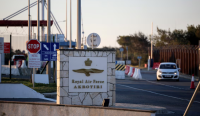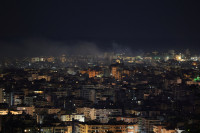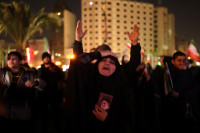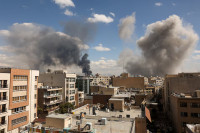World
Airlines face fresh upheaval as Iran attacks US airbase in Qatar
The escalating tensions are starting to affect airlines beyond the Middle East, where major flight routes have already been cut off since Israel began strikes on Iran on June 13.
Reuters
Airlines scrambled to cancel flights and reroute planes on Monday after several Middle Eastern nations closed their countries’ airspace temporarily as Iran attacked the Al Udeid US military base in Doha, the latest upheaval to air travel in a normally busy region.
On Sunday, the US attacked key Iranian nuclear sites and Tehran responded on Monday by firing several missiles at the US base without killing or injuring anyone.
The escalating tensions are starting to affect airlines beyond the Middle East, where major flight routes have already been cut off since Israel began strikes on Iran on June 13. On Monday, Air India said it would suspend flights to and from eastern North America and Europe as those routes use what has become an increasingly narrow path between those destinations and the Indian subcontinent.
After briefly closing their airspace, Bahrain and Kuwait both reopened them, according to state news media. Dubai Airports said its operations had resumed after a brief suspension, though it warned of delays or cancellations on social media site X. Qatar also closed its airspace.
The conflict has already cut off major flight routes to typically resilient aviation hubs such as Dubai, with the world’s busiest international airport, and Qatar’s capital of Doha. The usually busy airspace stretching from Iran and Iraq to the Mediterranean resembles a ghost town, devoid of commercial air traffic due to the airspace closures and safety concerns.
Air India said on Monday it had stopped all operations to the Middle East, but also flights to North America’s east coast and Europe. This included diverting flights already in the air back to their takeoff site, and away from closed airspaces.
“It’s terrifying,” said Miret Padovani, a business owner who was stranded at Doha’s Hamad International Airport. She was booked on a Qatar Airways flight to Thailand scheduled to leave late Monday, but cancelled her trip and is now planning on returning home to Dubai early on Tuesday.
“Everything happened so quick. I actually heard from people in the first class lounge that the missiles were being sent this way before they were even in the news.”
According to aviation analytics company Cirium, about two dozen flights to Doha, mostly from Qatar Airways, were diverted on Monday, and about a handful of flights to Dubai were diverted due to the airspace closures.
Kuwait Airways suspended on Monday its flight departures from the country, while UAE’s Etihad Airways was rerouting flights on Monday and Tuesday.
IAG’s Spanish airline Iberia scrapped a plan from earlier in the day to resume flights to Doha on Tuesday after the latest airspace closures.
With Russian and Ukrainian airspace also closed to most airlines due to years of war, the Middle East has become a more important route for flights between Europe and Asia. Amid missile and air strikes during the past 10 days, airlines have routed north via the Caspian Sea or south via Egypt and Saudi Arabia.
Carriers have likely been avoiding Doha, Dubai and other airports in the region due to concerns that Iran or its proxies could target drone or missile attacks on US military bases in these countries, aviation risk consultancy Osprey Flight Solutions said.
SUSPENSIONS
Earlier in the day, airlines had been weighing how long to suspend flights. Finnair was the first to announce a prolonged suspension of flights to Doha, with cancellations until June 30.
Leading Asian carrier Singapore Airlines planned to cancel flights to Dubai through Tuesday. Air France KLM, IAG-owned Iberia and British Airways, and Kazakhstan’s Air Astana all cancelled flights to either Doha or Dubai both on Sunday and Monday.
Air France also cancelled flights to Riyadh and said it would suspend flights to and from Beirut, Lebanon until Wednesday.
In the days before the US strikes, American Airlines suspended flights to Qatar, and United Airlines and Air Canada did the same with flights to Dubai. They have yet to resume.
Proliferating conflict zones are an increasing operational burden on airlines as aerial attacks raise worries about accidental or deliberate shoot-downs of commercial air traffic.
GPS interference around political hotspots, where ground-based GPS systems “spoof” or broadcast incorrect positions which can send commercial airliners off course, are also a growing issue for commercial aviation. SkAI, a Swiss company that runs a GPS disruption map, said late on Sunday it had observed more than 150 aircraft spoofed over the Persian Gulf in 24 hours.




 9.89°C Kathmandu
9.89°C Kathmandu














